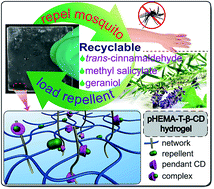pHEMA hydrogels with pendant triazinyl-β-cyclodextrin as an efficient and recyclable reservoir for loading and release of plant-based mosquito repellents: a new aqueous mosquito repellent formulation†
Abstract
Plant-based insect repellents are environmentally-friendly and play a practical and economic role in preventing the transmission of diseases to humans. Preformed 2-hydroxyethyl methacrylate-co-ethylene glycol dimethacrylate (pHEMA) hydrogels were functionalized with pedant triazinyl-β-cyclodextrin (T-β-CD) with the aim of improving the ability to host and release plant-based repellents. The structural and thermal properties were investigated by FTIR and thermogravimetric analysis, respectively. The most potent mosquito repellents, geraniol, methyl salicylate and trans-cinnamaldehyde, were screened from 35 plant-based compounds through Y-tube olfactometer assay. Pendant T-β-CDs did not affect the swelling of the hydrogels and exhibited low cytotoxicity towards mouse embryo fibroblasts, and no skin irritation or allergy was observed on human skin treated with modified hydrogels loaded with repellents. The physicochemical properties of the repellent and its affinity to form complexes determined the role played by the CDs in the loading and release. Methyl salicylate possessed an optimal stability constant KS (232.19 M−1) and thus it got a longer protection duration with higher repellent activity. Increasing the crosslink density resulted in decreases in the degree of swelling, the amount of T-β-CDs bonded to hydrogels, and the duration of complete repellency. Additionally, pHEMA hydrogels with pendant T-β-CDs showed good recyclability. The new hydrogel formulation loaded with plant-based repellents may provide a suitable, eco-friendly and safe approach to achieve protection against mosquitoes.


 Please wait while we load your content...
Please wait while we load your content...